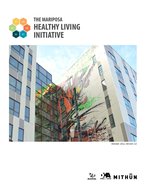Found 19 resources.
0
0
0
One Summer Chicago Plus is a jobs program designed to reduce violence and prepare youth living in some of the city’s highest-violence neighborhoods for the labor market. This study was carried out over the summer of 2013 in partnership with the Chicago Department of Family and Support Services. It found that the program, which provided a six-week, minimum-wage job for 25 hours a week, reduced the number of violent-crime arrests for participants by 33 percent over the subsequent year. The One Summer Chicago Plus 2013 study—accompanied by a long-term follow-up of the 2012 program—closely...
Topics: Child welfare, Community development, Criminal justice, Out-of-school time, Partnerships, Preventative care, Safety, Youth
 Shared by Housing Is
on Oct 15, 2020
Shared by Housing Is
on Oct 15, 2020 0
0
0

Houston children continue to be poisoned by lead even though childhood lead poisoning is considered the most preventable environmental disease among young children. In the past three years, almost 1,200 Houston children between 0 and 72 months old were found to have lead in their blood above the reference value of concern set by Centers for Disease Control and Prevention. The Houston Health Department (HHD) has hosted the Lead-Based Paint Hazard Control Program (LBPHCP) for over 25 years, with the goal of providing a lead-safe home environment through home investigations and home lead...
Topics: Early childhood, Health, Housing, Lead, Partnerships, Safety
 Shared by Housing Is
on Apr 8, 2019
Shared by Housing Is
on Apr 8, 2019 0
0
0
The Legal Bibliography is collection of 100+ papers, toolkits and other materials focused on privacy, consent and policy documentation. Co-developed by the Network for Public Health Law and Data Across Sectors for Health (DASH), the Bibliography is a growing resource for lawyers and community data practitioners, intended to support local collaboratives in their efforts to share data across sectors.
Topics: Criminal justice, Data sharing, Education, Health, Homelessness, Housing, Mental health, Partnerships, Safety
 Shared by Housing Is
on Apr 8, 2019
Shared by Housing Is
on Apr 8, 2019 0
0
0
While the program has changed very little since its inception, the need for the program has increased. In 1975, the number of program grantees stood at 594. Today, the number of grantees stands at 1,268 as more communities qualify to receive direct program allocations. Based on a CDBG Needs Survey conducted by the CDBG Coalition (and discussed later in this report), CDBG grantees have delayed and canceled projects and reduced or permanently eliminated programs because of a lack of CDBG funds. CDBG is an important investment tool for communities and neighborhoods, but program funding must...
Topics: Community development, Funding, Health, Homelessness, Housing, Legislation & Policy, Low-income, Partnerships, Research, Safety, Seniors
 Shared by Housing Is
on Apr 8, 2019
Shared by Housing Is
on Apr 8, 2019 0
0
0

Join us for an examination of how cross-sector data sharing initiatives are being used to tackle tough public health problems. The webinar will provide an in-depth look at a cross-sector collaboration in Illinois between public health, law enforcement, emergency medical services, a fire department and a jail aimed at addressing the needs of high utilizers of behavioral health services.
Topics: Criminal justice, Data sharing, Health, Mental health, Midwest, Partnerships, Safety, Stability
 Shared by Housing Is
on Mar 6, 2019
Shared by Housing Is
on Mar 6, 2019 0
0
0
The firearm, obesity, and opioid epidemics are among the most important public health crises of our time. Each epidemic has a complex etiology that challenges efforts at mitigation. From this, a central question arises for researchers, clinicians, and policymakers: How can we identify what matters most within a broad range of causal factors in these epidemics, and can we draw cross-epidemic inferences that will help inform our thinking?
Topics: Food insecurity, Health, Low-income, Nutrition, Obesity, Partnerships, Safety, Substance abuse
0
0
0
This article shows how a complex systems perspective may be used to analyze the commercial determinants of noncommunicable diseases (NCDs), and it explains how this can help with (1) conceptualizing the problem of NCDs and (2) developing effective policy interventions.
Topics: Health, Partnerships, Research, Safety
0
0
0
Communities can leverage local housing and neighborhood policies to address gun violence through tools such as demolition, vacant property maintenance and reuse, foreclosure mitigation counseling, homeownership support programs, code enforcement, and zoning.
Topics: Community development, Housing, Partnerships, Place-based, Safety
 Shared by Housing Is
on Dec 20, 2018
Shared by Housing Is
on Dec 20, 2018 0
0
0
Webinar slide deck that provides a brief overview of FUP, building blocks of successful FUP voucher implementation, facilitated panel on increasing impact and enhancing FUP operations, and other opportunities and resources.
Topics: Child welfare, CLPHA, Foster care, Funding, Housing, Legislation & Policy, Low-income, Partnerships, Preventative care, Safety, Supportive housing, Youth
0
0
0
Resources for integrating resiliency, hope, and wellness in schools
Topics: Child welfare, Low-income, Partnerships, Place-based, Research, Safety
0
0
0
After decades of sprawl and suburban dominance, U.S. cities are experiencing rebounding populations, growing employment, and new public and private sector investments in places that are walkable, transit-oriented, and support diverse people and amenities. But we know that the benefits of these trends are not equally distributed, presenting an urgent opportunity for local and regional leaders to advance place-led development that produces better economic outcomes for more people in more places.
To help deliver on that imperative, the Metropolitan Policy Program at Brookings launched the...
Topics: Community development, Housing, Partnerships, Place-based, Safety, Stability
0
0
0
It’s no secret that survivors of domestic and sexual violence make up a large percentage of the families and individuals who seek help from the homeless/housing services system. No one expects homeless/housing programs to become an extension of the victim services system. But the intersection between homelessness and domestic and sexual violence requires both systems to do their work with that reality in mind.
Topics: Child welfare, Domestic violence, Homelessness, Housing, Legislation & Policy, Partnerships, Safety
0
0
0

In January, mothers with substance-abuse disorders will have a long-term resource to help break the cycle of their addiction. That’s when Tucson Medical Center and CODAC Health, Recovery and Wellness, in partnership with the Connie Hillman Family Foundation, open their new transitional housing program in midtown Tucson for mothers who are battling drug or alcohol addiction.
Topics: Homelessness, Housing, Low-income, Partnerships, Safety, Stability, Substance abuse
0
0
0
Around the country, there is a growing understanding that survivors of domestic violence often need more than emergency shelter to become safe from violence and establish stable homes. Communities are employing innovative strategies and practices that help address survivors’ unique situations, such as flexible funding and domestic violence rapid re-housing. This momentum is matched by increasing resources from federal, state, and local funders interested in supporting safe housing solutions. But until stakeholders recognize the extent of the need for safe housing, many survivors will continue...
Topics: Domestic violence, Homelessness, Housing, Legislation & Policy, Partnerships, Safety
0
0
0
CLPHA’s Education Working Group hosts a webinar with Bright by Text, a texting platform that connects caregivers with tools for improving educational outcomes for children. Bright by Text’s President and Senior Program Manager share information about their partnerships with housing authorities and non-profit housing providers across the country, providing insight into the benefits of connecting with residents through technology. CLPHA members who work with Bright by Text outline their respective initiatives and discussed local program goals.
Topics: Child welfare, CLPHA, Dual-generation, Early childhood, Family engagement, Health, Home visiting, Housing, Housing Is Working Group, Partnerships, Place-based, Preventative care, Safety, School-readiness
0
0
0
The Mariposa Healthy Living Initiative began in 2009, when the Denver Housing Authority and its master planning team established physical, mental, and community health as a proxy to understand how redevelopment actions would change the quality of life for residents. The Initiative recognizes that the built environment is a determinant of health outcomes, which ultimately influence the quality and length of life for residents. The Initiative uses a responsive and rigorous approach to address environmental and social determinants of health, which include Healthy Housing, Environmental...
Topics: Housing, Low-income, Partnerships, Place-based, Preventative care, Research, Safety, Transportation, West Coast
 Shared by Housing Is
on Jul 17, 2018
Shared by Housing Is
on Jul 17, 2018 0
0
0
The Trauma Informed Community Building (TICB) model is based on BRIDGE Housing Corporation’s experience doing community building work over the past five years in the Potrero Terrace and Annex public housing sites in San Francisco, CA.
Topics: Child welfare, Community development, Dual-generation, Family engagement, Low-income, Mental health, Partnerships, Place-based, Preventative care, Research, Safety
 Shared by Housing Is
on Jul 12, 2018
Shared by Housing Is
on Jul 12, 2018 0
0
0
Reducing Pediatric Asthma through Home Improvements and Education
Topics: Asthma, Child welfare, Community development, Cost effectiveness, Data sharing, Early childhood, Education, Family engagement, Health, Healthy homes, Housing, Low-income, Medicaid / Medicare, Metrics, Partnerships, Place-based, Preventative care, Research, Safety
 Shared by Housing Is
on Jul 10, 2018
Shared by Housing Is
on Jul 10, 2018 0
0
0

Why do some neighborhoods appear able to launch effective local improvement initiatives, while others are more hampered by fragmentation and mistrust? Why can some communities mobilize diverse constituencies to influence public policy, while others cannot? Answers to these questions may be found in the specific patterns of collaboration that form among community organizations, and between these groups, schools, public agencies, and elected officials, according to MDRC, a preeminent social-policy research organization.
Topics: Asset building, Child welfare, Community development, Data sharing, Dual-generation, Education, Family engagement, Funding, Health, Housing, Legislation & Policy, Low-income, Metrics, Midwest, Mobility, Out-of-school time, Partnerships, Place-based, Preventative care, Research, Safety, Stability, Workforce development, Youth




